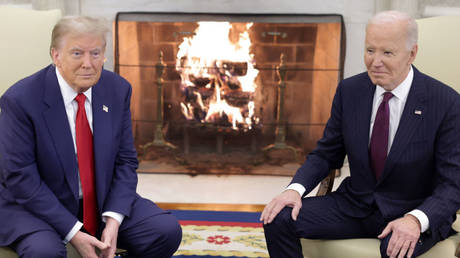Fyodor Lukyanov: Biden Aims to Implicate Trump in Ukrainian Affairs
The White House acknowledges that negotiations to resolve the conflict are unavoidable, but aims to postpone the inevitable conclusion.

Since it became known that the US has authorized Ukraine to carry out long-range strikes deep within Russia, there has been significant backlash. This reaction stems from a couple of factors.
Firstly, Moscow has issued strong warnings that such actions will be interpreted as NATO's direct involvement in the conflict. Secondly, the recent shifts in the political landscape in the US have contributed to the concerns surrounding this decision.
The differences in foreign policy between the current and incoming American administrations are most stark when it comes to Ukraine. Meanwhile, Kiev is desperately seeking avenues to counteract a situation that is increasingly detrimental to its interests. Western Europe is also facing turmoil, as political leaders struggle to grasp the enormity of the changes on the horizon.
The announcement, which appears to mark a pivotal moment, was quickly downplayed—or even denied. French and British officials were swift to clarify that they had not provided similar authorizations, asserting that they were merely contemplating the option.
In the US, sources close to the current administration specified that any proposed strikes would only be permitted in areas where fighting is ongoing. Notably, the spectrum of responses from Western nations has been remarkably broad, ranging from enthusiastic approval from staunch Ukraine supporters, including liberal NGOs, EU's hardliner Josep Borrell, and the governments of Eastern European countries, to sharp criticism from representatives of the future Donald Trump-led administration and certain officials in Europe.
In summary, while the weapons under discussion could complicate Russia's operations, they are unlikely to fundamentally alter the course of the campaign. However, they pose a significant risk for escalation, with unclear limits. A frequently posed question is why this decision, which Kiev has pursued throughout the year, has been made now. Several purely speculative explanations exist.
Officially, it has been suggested that the catalyst was intelligence regarding the presence of North Korean units near the conflict zone, though this claim lacks verification. It is believed that the White House intends to send a signal to Pyongyang to cease its collaboration with Moscow by permitting strikes on their purported bases.
While it may be pointless to debate the accuracy of these assertions, two observations are pertinent. First, it is puzzling why the rumored involvement of North Korean forces has caused such an uproar. Second, it remains unclear why Kim Jong-un, perceived in Washington as a formidable totalitarian, would suddenly react to this purported signal and reconsider his alleged decisions, if they were ever made.
Another theory posits that the US administration recognizes the inevitability of negotiations to end the conflict and that Ukraine’s position is becoming increasingly weak. Therefore, it is crucial to help Kiev bolster its bargaining power, potentially by establishing a foothold in the Kursk border area for future negotiations. Whether supporters of this theory are correct is uncertain, but unpredictable outcomes are certainly not new.
Lastly, it is essential to consider the prevailing opinion among commentators in both the West and Russia. The Biden administration appears to be striving to secure its historical legacy while complicating the efforts of Trump’s incoming team to navigate the Ukraine crisis. The legacy narrative is complex; the initial aim was to strategically weaken Russia and reassert American and Western dominance globally.
Now, the focus seems to be on prolonging the conflict in hopes of creating more favorable conditions for Ukraine and unfavorable ones for Russia. The outcome of this strategy remains uncertain. Some associates of Trump have been vocally critical, accusing Biden of trying to instigate World War III. Indeed, if Trump inherits a high-stakes confrontation, the burden of responsibility will be substantial, and options for maneuvering will be constrained. However, there is speculation that such a scenario might serve Trump’s interests, as he could pivot the US foreign policy direction upon taking office, citing real threats of direct military involvement.
This speculation is plausible, but it remains uncertain how Trump will approach this situation. His governance strategy, rooted in business, often references potential deals. However, his first term demonstrated that business tactics do not seamlessly translate into international relations.
The team that will shape his policy is exceptionally diverse, ranging from market disruptors like Elon Musk to traditional Republican figures in the State Department and national security roles. Achieving a balanced approach will prove challenging.
As it stands, we are entering a precarious phase, with heightened risks of an uncontrollable confrontation. The final days of Democratic leadership in Washington are likely to be fraught with uncertainty.
This article originally appeared in Rossiyskaya Gazeta and has been translated and edited by the RTN team.
Olivia Brown for TROIB News
Find more stories on Business, Economy and Finance in TROIB business












